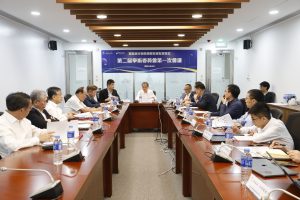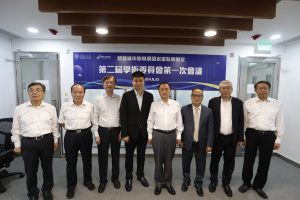The State Key Laboratory of Internet of Things for Smart City (SKL-IOTSC) of the University of Macau (UM) held the first meeting of its second academic committee. Experts and scholars attended the meeting to discuss the development and future direction of the laboratory.
The meeting was attended by Ip Kuai Lam, member of the Administrative Committee of the Science and Technology Development Fund (FDCT) of Macao; Mei Hong, member of the Chinese Academy of Sciences and president of the academic committee; Cheng Shijie, Jin Hongguang, and Li Hui, members of the Chinese Academy of Sciences; Fan Weicheng, Zhang Ping, and Li Keqiang, members of the Chinese Academy of Engineering; Lionel Ni, founding president of the Hong Kong University of Science and Technology (Guangzhou); Jin Shi, vice president of Southeast University; and Qiao Yu, professor at Shanghai Artificial Intelligence Laboratory.
The meeting was chaired by Mei, with speeches delivered by Ip and Yonghua Song, rector of UM and director of SKL-IOTSC. Song expressed his gratitude to the participating experts for their support, guidance, and encouragement to the university and the laboratory. He added that SKL-IOTSC will continue to adhere to its original aspiration, uphold the scientific spirit, and contribute to the smart and sustainable development of cities through advancements in science and technology.
Ip said that since its establishment, SKL-IOTSC has consistently made significant breakthroughs, and many of its research results have received national and international awards, such as the Guanghua Engineering Science and Technology Prize, National Innovation Excellence Award, State Scientific and Technological Progress Award, Macao Science and Technology Award, and Junior Research Prize from the European Association for Structural Dynamics. The laboratory is dedicated to smart city development and technological innovation, continuously making major breakthroughs. It has built an international-level simulation and decision-making platform for intelligent management and decision-making in smart cities. The platform focuses on key application areas such as smart energy, smart transportation, urban safety and disaster prevention, and has made important contributions to Macao’s sustainable development. SKL-IOTSC is also committed to promoting industry-academia integration, and has signed an innovation cooperation agreement with China Southern Power Grid to jointly develop key digital grid technologies and promote their application in the Guangdong-Hong Kong-Macao Greater Bay Area. In addition, through theoretical and technological innovations in urban disaster prevention, advanced sensors have been developed and successfully applied in structural health monitoring in major projects such as the Hong Kong-Zhuhai-Macao Bridge, and the Second Hengqin Bridge of the Guangdong-Macao In-depth Cooperation Zone in Hengqin. The laboratory also actively explores innovative methods in energy management and urban governance to help improve Macao’s disaster resilience and energy management.
Ip expressed hope that SKL-IOTSC will continue to uphold the spirit of original research, drive breakthroughs in scientific research, address core technical challenges in the Internet of Things and smart cities, and achieve deep integration of technological innovation and industrial development. The laboratory is also expected to strengthen cooperation with experts in various fields, actively expand international exchanges, and attract outstanding researchers with international perspectives, so as to further enhance Macao’s influence and competitiveness in scientific research. Additionally, he hoped that the laboratory will actively participate in industry-academia collaboration to promote the transformation of science and technology research results and provide robust support for Macao’s sustainable development.
Ma Shaodan, associate director of SKL-IOTSC, gave a comprehensive report on the laboratory’s developments and research achievements in 2024, and detailed its development plan and focus. The committee members gave full recognition and spoke highly of the laboratory’s accomplishments in technological innovation, talent cultivation, industry-academia collaboration, and open projects. They suggested that the laboratory should commit itself to advancing major research projects, deepening basic theoretical and technical research, and promoting the transformation of science and technology research results, thus leveraging Macao’s advantages and actively participating in major national science and technology projects.
At the end of the meeting, Song thanked the committee members for their suggestions. He said that with the guidance and assistance of the academic committee, SKL-IOTSC will use outstanding talent as its cornerstone to reach new heights in scientific research, and make substantial contributions to the development strategies of Macao and the country. The meeting was also attended by eight key researchers from the laboratory. Through in-depth discussions and exchanges, they provided important guidance and insights for the development and technological innovation of the Internet of Things for smart cities.
| Source: State Key Laboratory of Internet of Things for Smart City | |
| Media Contact Information: | |
| Communications Office, University of Macau | |
| Albee Lei | Tel: (853) 8822 8004 |
| Jason Leong | Tel: (853) 8822 8322 |
| Email: | prs.media@um.edu.mo |


